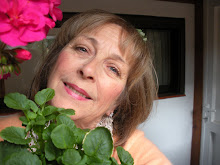Pages

- Julie
- WHETHER YOU ARE JUST PASSING THROUGH OR ARE A FREQUENT VISITOR -A VERY SPECIAL WELCOME TO YOU! HAVE A GOOD LOOK AROUND - I HOPE YOU FIND SOMETHING TO HELP YOU ON YOUR PATH... YOU ARE ALWAYS WELCOME! HEALTH, BLESSINGS AND LIGHT. The alternative treatments/therapies discussed on this blog are not intended to replace the advice of a health professional. They are shared with the understanding that each individual accepts full responsibility for his or her own well being.

Thursday, 10 October 2013
Wednesday, 9 October 2013
Wednesday, 2 October 2013
POT POURRI - How to make your own
Make your own pot pourri by mixing together dries flowers, leaves and herbs from your garden (citrus blossoms, cornflowers, pinks, lavender, rose, geranium etc.) with spices ( cinnamon sticks, nutmeg, cloves, allspice etc.) and a little talcum powder and your chosen essential oils. For best results the base mix should contain 6 cups of dried plants, 2 tablespoons of talc and 12 drops of essential oils.
The mixture should be left in an air-tight container (inverting and shaking daily) for about 2 weeks until the aromas have been absorbed by the talc and dried ingredients.
It is then ready to put into an open bowl or jar to give fragrance to a room. It can be refreshed periodically by adding a few more drops of essential oils.
BEST OILS FOR FRESHENING
LAVENDER - TO KILL AIRBORNE GERMS
*
LEMON - air freshener to the bathroom
*
PEPPERMINT - to remove stale smell of tobacco smoke
BEST COMBINATIONS
3 Drops each of Pine, Rosemary, Lavender (disinfecting, for bathrooms, rubbish bins, damp or mould)
*
5 Drops each of Lemon and Lime (deodourising, for wardrobes, cupboards bathrooms, cooking smells)
Tuesday, 1 October 2013
THE SAFE USE OF ESSENTIAL OILS - guideline
1. Undiluted essential oil should never be used directly on the skin. Always keep a bottle
of carrier oil or any pure vegetable oil handy when using essential oils.
Vegetable oils dilute essential oils if they cause discomfort or skin
irritation. DO NOT USE WATER as essential oils are non-water soluble. Using water would only
spread the essential oil over a larger area.
2. Some oils can cause desinsitising or allergy in some people. Also people with allergies
should test a small amount of oil on a small area of sensitive skin, such as
the inside of the arm, before applying the oil on other areas. The bottom of
the feet is one of the safest, most effective places to use essential oils.
3. Less is more : in other words if you can get the job done with one drop - don't use two.
4. Essential oils are flammable - keep them safely away from fire hazards.
5. Keep bottles of
essential oils tightly closed and store them in a cool location away from
light. If stored properly, essential oils will maintain their potency for many
years.
6. Keep essential oils
out of the reach of children. Treat them as you would any product for
therapeutic use.
7. Do not use essential
oils rich in menthol (such as peppermint) on the throat or neck area of children
under 30 months of age.
8. Lemon, bergamot,
orange, grapefruit, tangerine, White Angelica and other citrus oils may cause a
rash or darker pigmentation if applied to skin exposed to direct sunlight or UV
rays within 3-4 days of use.
9. Keep essential oils
away from eye area and do not put into ears. Do not handle contact lenses or
rub eyes with essential oils on fingers.
10. Pregnant women should
consult their health care professional before using essential oils containing
constituents with hormone-like activity, such as Clary sage, Idaho tansy,
juniper and fennel.
11. Epileptics and those
with high blood pressure should consult their health care professional before
using essential oils. Avoid hyssop, fennel, and Idaho tansy oils.
Subscribe to:
Comments (Atom)




